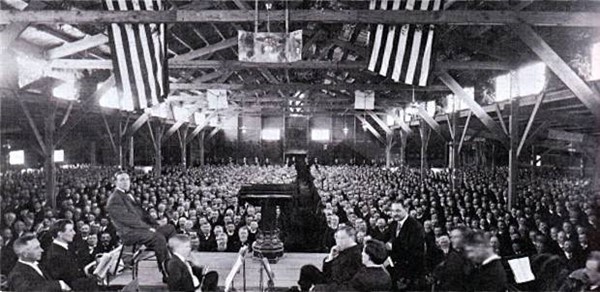In previous decades it was common for churches to annually (or several times per year) conduct “revival services.” These scheduled services were for the express purpose of bringing the believers back to a renewed commitment and devotion to the Lord.
The traditionally scheduled revival services would usually last 1-2 weeks, and the church would invite a noted evangelist to come and speak every night for the duration. During these scheduled revival services it was common for:
1. The manifest presence God’s to be experienced.
2. Many believers would be set free from bondages to sin and they would renew their commitment to the Lord.
3. Believers would invite their lost friends, family, co-workers, and neighbors to the meetings and many would get saved.
4. Healings would take place.
5. People would be found weeping for hours while they kneeled at the altar (a wooden rail that was common at the front of churches during those days), calling out to God for the salvation of sinners.
6. The services would commonly last till 10 p.m., and sometimes till midnight or later. (When people experience God’s presence they are not anxious to leave.)
a. Parents weren’t concerned if their children weren’t in their beds at the appointed times. If children were tired, they would be put to sleep on the floor under the pew.
b. Those that had to rise early in the morning for jobs would simply do without that sleep. They were more interested in being in the presence of God than getting to bed early.

Billy Sunday Revival Meeting
Time Not Allotted for the Traditionally Scheduled Revival Services
Today it is very rare for churches to schedule revival services. Here are a few of our observations why this is now the case:
1. Churches have gone to multiple services on Sunday mornings and Saturday nights, making the workforce for scheduled revival services every night of the week too demanding.
2. With many churches using rented facilities, they don’t have a location where they can meet every night for a week or more.
3. The majority of the people have little interest in seeking God’s presence and making a renewed commitment to Him, and to schedule services that would be poorly attended would be highly discouraging.
4. Churches have modified their schedules to accommodate the pressures on family schedules.
In the post titled: “Prone to Wander,” we showed the cycle of sin and revival that has occurred in the lives of God’s people, beginning in the Old and New Testaments and continuing up till our present day. The Old Testament took into account the wandering heart of man, our proneness to depart from Him, and our tendency to become lethargic in our devotion and consecration. To address this condition God instituted times to be set aside for corporate renewal. These special times, as found in Lev. 23:2, have been translated as:
- Holy Convocations (NKJV)
- Sacred Assemblies (NIV)
- Holy Meetings (EXB)
- Holy Assemblies (GNV)
- Holy Occasions (CEB)
Henry T. Blackaby, in his book Fresh Encounter, lists the reasons for these sacred assemblies found in the Old Testament:
1. Demonstrate obedience to God and to His commands and decrees.
2. Call into remembrance God’s provisions for His people.
3. Acknowledge God’s ownership of all one’s resources (time and material).
4. Provide special opportunities to offer sacrifices.
5. Recognize God in His holiness.
6. Confess and repent of personal and corporate sins.
7. Renew fellowship and the covenant made with God.
There is no need for us today to revert back to the Old Testament law, but there is something beneficial that could be derived by setting aside special times for the express purpose of making a renewed commitment, consecration, and devotion to the Lord. Who knows, maybe by churches scheduling the traditionally known revival services, for the purpose of confessing sins, repenting, and turning to God with renewed consecration, maybe God would honor that and grant a fresh outpouring of His Spirit, that would ultimately lead to the conversion of thousands.
During the massive revivals that swept upstate New York during the 1820’s-1840’s, protracted meetings were what was used to initiate them.
In Robert Evan’s book, Fire From Heaven, he cites the The Presbyterian General Assembly of 1832, that after reviewing the work of God over the previous year, they listed “sixty-eight presbyteries and seven hundred congregations” as having been blessed with revivals. “Almost all of them [i.e. of their churches] have had precious seasons of revival, and these, with few exceptions, connected with what are called protracted meetings.”
The Need for Renewed Commitment & Devotion
James Stewart, in his article “Not Ready – Do We Really Want Revival?” illustrates the importance of these periodic occasions for renewal of commitment and devotion.
“During the mighty days of revival in Lativa when God brought His Church out of bondage into a glorious elevated position with Christ in the Heavenlies, I discovered, over a period of four years that it was necessary for us all to be periodically broken down before the Lord, and to renew our vows of devotion and loyalty.
There was always a tendency to relax in our fervor and to rely upon a past experience. We soon realized the necessity to watch and pray and keep abiding in Christ by the systematic reading of His Word and prompt obedience. One of the local churches that had experienced possibly the mightiest awakening of all and who saw the mightiest move of God in the salvation of souls, within nine months was found sleeping.”

